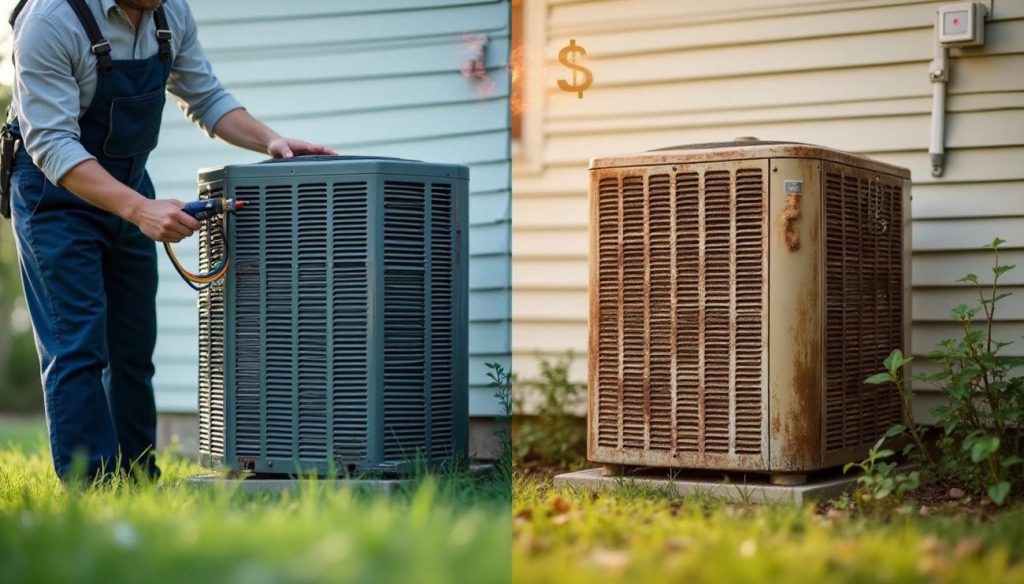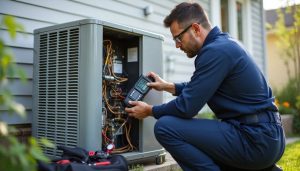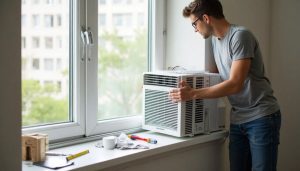The benefits of AC maintenance are way beyond just keeping your home cool. A shocking 85% of AC breakdowns during summer happen to homeowners who skip regular maintenance. These homeowners end up paying for expensive emergency repairs while they sweat it out. Your air conditioner’s maintenance might look like an optional expense, but the numbers paint a clear picture.
Regular AC maintenance costs about $200 per year, which is nowhere near the typical repair costs of $450 to $1,000. On top of that, a well-maintained air conditioner can last up to 15 years. Neglected systems need replacement much earlier – a hefty expense of up to $7,500. Your AC system uses more than half of your household’s energy. Regular maintenance helps your system run efficiently and can reduce energy consumption by 5-15%. This means lower monthly bills for you. Many homeowners ask “is HVAC tune-up worth it?” or “how often AC maintenance should be performed.” You’re about to find out why AC maintenance is crucial to protect both your comfort and wallet.
What is an AC tune-up and why it matters
A professional AC tune-up includes a complete inspection, cleaning, and performance optimization of your air conditioning system. Your AC system needs regular maintenance to work properly, just like your car needs oil changes. These tune-ups help keep your cooling system running efficiently and reliably.
How AC systems wear down over time
Your air conditioner has hundreds of parts that work together, and regular use leads to gradual wear. Mechanical parts like belts, motors, and bearings naturally break down as systems get older. Dust, dirt, and moisture build up on important parts throughout the year, which makes your unit work harder.
Common wear points include:
- Ignition and pilot systems
- Evaporator coils (which can develop leaks)
- Condensation pumps
- Electrical connections
One failing component puts extra stress on other parts, which creates a domino effect of system strain. So, your system’s efficiency drops steadily while energy use goes up without proper care.
The role of preventive maintenance
Preventive maintenance fights against the wear and tear your air conditioner gets during normal use. Regular tune-ups let trained technicians spot and fix small issues before they turn into big, pricey problems.
Professionals clean dirty components, tighten electrical connections, lubricate moving parts, and test system performance during maintenance visits. This reduces unnecessary strain on your system. Regular maintenance can reduce part failure chances by up to 95 percent, which makes it a vital investment.
Is HVAC tune-up worth it?
Absolutely. The U.S. Department of Energy says an annual AC tune-up can save up to 15% on your energy bills. A household with average yearly energy costs of $1,200 can save about $180 per year.
Regular tune-ups usually cost between $85 and $200, which doesn’t match emergency repair costs. Well-maintained systems also give you:
- More even cooling throughout your home
- Better indoor air quality
- Longer equipment life (up to 15 years instead of just 10)
- Warranty coverage stays active (many manufacturers require professional maintenance)
We invested in regular maintenance because it pays for itself through lower energy bills, fewer repairs, and systems that last longer.
What’s included in a professional AC maintenance visit
Professional technicians perform a detailed series of checks and services during an AC maintenance visit to keep your system running at its best. A full maintenance checkup will give a peak performance and prevent future problems.
Filter replacement and coil cleaning
Your AC maintenance starts with filter replacement – the simplest yet most significant part of the service. Clean filters improve airflow and indoor air quality, and reduce energy usage by up to 15%. The technicians clean evaporator and condenser coils to remove built-up dirt and debris that make your system work harder. Your system’s energy consumption can increase by up to 30% with dirty coils, which makes this cleaning step vital to efficiency.
Checking refrigerant levels and leaks
Your system needs proper refrigerant levels to work well. Technicians measure refrigerant pressure to match manufacturer specifications. They conduct leak tests on all refrigerant lines and connections. Small leaks can reduce efficiency by up to 20% and lead to complete system failure if ignored.
Inspecting electrical components and connections
Electrical problems cause about 60% of AC system failures. Technicians get into all electrical connections, tighten loose terminals and measure voltage and current on motors. They inspect contactors for signs of arcing and check capacitors – components that often fail but are cheap to replace during routine maintenance.
Clearing condensate drains and ducts
Clogged condensate drains are one of the most common AC problems. The technicians clean these drains to prevent water damage and mold growth. Your system’s ductwork gets inspected for leaks that can waste up to 30% of the cooled air.
Testing system performance and airflow
The technicians test your system’s overall performance by measuring airflow, checking thermostat calibration, and verifying proper cycling. This detailed evaluation shows how all components work together. They measure temperature differences between supply and return air – a key indicator of your system’s health.
These maintenance procedures ended up working together to deliver the benefits of AC maintenance that protect your comfort and investment.
Hidden money-saving benefits of regular AC maintenance
AC maintenance isn’t just about keeping your system running—it’s a smart money move with several hidden perks. We discovered these benefits add up to substantial savings throughout your system’s lifetime.
Lower energy bills through improved efficiency
A well-maintained AC system runs at peak efficiency and uses less energy to cool your home. Studies show regular maintenance can improve operational efficiency by up to 15%. Your monthly utility bills drop as a result. Clean filters alone can reduce energy consumption substantially. Dirty components make your system work harder and increase energy usage by up to 30%.
Avoiding costly emergency repairs
The best part about maintenance is preventing unexpected breakdowns. Proactive maintenance spots small issues before they become big problems. Skilled technicians can identify potential failures during routine inspections. This helps you avoid emergency service calls that get pricey compared to scheduled maintenance. Air conditioners rarely stop working without warning. Problems usually develop gradually and regular check-ups can catch them early.
Extending the life of your AC system
Well-maintained AC systems last 15-20 years. Neglected units often need replacement after just 10 years. This longer lifespan saves you thousands in delayed replacement costs. Regular tune-ups reduce wear on critical components and decrease system strain. HVAC specialists have seen systems last up to 20 years with consistent maintenance.
Maintaining warranty coverage
Many AC manufacturers want proof of regular maintenance to keep warranties valid. Your warranty claims might be denied without documented annual service. You could end up paying for repairs that should be covered. Most warranty documents clearly state that proper maintenance needs to happen at least once yearly. Your annual tune-up protects your warranty coverage.
Regular maintenance isn’t an expense—it’s an investment that pays off through improved efficiency, fewer repairs, and a system that lasts longer.
How often should you schedule AC maintenance?
Your AC system’s maintenance schedule depends on several key factors. We need to schedule service at the right intervals to optimize efficiency and keep costs down.
Annual vs bi-annual maintenance
Most homeowners should service their AC at least once a year. This yearly checkup gets your cooling system ready for the season ahead and will give a thorough check of all components. Many HVAC professionals recommend bi-annual maintenance – a spring check for cooling systems and a fall check for heating components.
Homeowners in regions with extreme temperatures should definitely opt for twice-yearly service. Systems in southern areas need more frequent checks because they run harder throughout the year. While yearly service works well for many people, bi-annual maintenance provides extra protection that can extend system lifespan to 20 years instead of the usual 15-year maximum.
Best time of year for a tune-up
Spring is the best time to get your AC checked. HVAC expert Jordan Fleming puts it well: “Spring is when your system has been sitting idle for months, gathering dust and debris, so it’s the perfect time for a tune-up before the summer rush”. You’ll get faster appointments if you schedule early in spring, before the peak season starts.
If you’re doing bi-annual maintenance, early fall is your second best option. This timing ensures your system gets checked before each major use period. Summer maintenance should be avoided because HVAC companies are swamped then, which means higher prices and longer waits.
Factors that affect maintenance frequency
Your system might need more frequent checks based on:
- System age: Units near 10 years old need more regular check-ups
- Usage patterns: Systems that run constantly need extra attention
- Environmental conditions: Homes with dust or pets need more frequent filter replacements
- Climate extremity: Severe weather areas might need extra service visits
Note that filters need much more frequent changes than professional maintenance—usually every 30-90 days based on your usage and environment.
Conclusion
Regular AC maintenance stands out as one of the smartest investments for homeowners who care about comfort and financial stability. This piece shows how maintenance costs of around $200 annually are nowhere near the cost of emergency repairs that typically range from $450 to $1,000. It also delivers energy savings of 5-15% that reduce monthly bills year after year.
Your air conditioner naturally wears down over time, whatever its quality or original installation. Professional maintenance fights this deterioration and fixes small issues before they turn into major system failures. This smart approach pays for itself by extending your equipment’s life. Your system can last 15-20 years instead of needing replacement after just 10 years.
The evidence shows maintenance is essential, not optional. Manufacturer warranties often need documented annual service. Your tune-up protects against potential covered repairs. Clean filters, properly functioning coils, and optimized refrigerant levels work together to boost cooling performance and indoor air quality.
Most homeowners should schedule at least annual maintenance, preferably in spring before peak cooling season starts. Those living in extreme climates or with older systems benefit from twice-yearly check-ups to protect their system and maximize efficiency.
AC maintenance boils down to simple math. A small upfront investment prevents much larger emergency repair costs. It cuts energy bills and extends system life. Skipping maintenance when money is tight might seem tempting, but it definitely costs more later. Take care of your AC system now, and without doubt, it will keep you comfortable through many summers ahead.
FAQs
Q1. How often should I schedule AC maintenance? For most homeowners, annual maintenance is recommended, ideally in spring before the cooling season begins. However, those in extreme climates or with older systems may benefit from bi-annual check-ups to maximize efficiency and system longevity.
Q2. What are the financial benefits of regular AC maintenance? Regular AC maintenance can lead to significant cost savings through lower energy bills (up to 15% reduction), avoiding expensive emergency repairs, extending the system’s lifespan (up to 15-20 years), and maintaining warranty coverage.
Q3. What does a professional AC maintenance visit typically include? A professional AC maintenance visit usually includes filter replacement, coil cleaning, refrigerant level checks, electrical component inspection, condensate drain clearing, and overall system performance testing.
Q4. Can regular AC maintenance really improve energy efficiency? Yes, regular AC maintenance can improve operational efficiency by up to 15%. Clean filters alone can significantly reduce energy consumption, as dirty components force the system to work harder, potentially increasing energy usage by up to 30%.
Q5. Is it worth investing in AC maintenance if my system seems to be working fine? Absolutely. Even if your AC seems to be working fine, regular maintenance can prevent unexpected breakdowns, ensure optimal performance, and extend the system’s lifespan. It’s a proactive approach that can save you money in the long run and maintain your comfort throughout the cooling season.
References
[1] – https://www.lennox.com/residential/lennox-life/consumer/beating-the-heat-is-an-ac-tune-up-worth-it
[2] – https://www.eascoair.com/mechanical-wear-and-tear-on-your-heating-air-conditioning-system/
[3] – https://gilmoreair.com/blog/do-i-really-need-an-ac-tune-up/
[4] – https://whitemechanical.com/how-to-establish-the-right-maintenance-schedule-for-your-ac-system/
[5] – https://www.energy.gov/energysaver/air-conditioner-maintenance
[6] – https://summersphc.com/kokomo/2025/04/how-an-ac-tune-up-can-lower-your-energy-bills-in-indiana/
[7] – https://generalac.com/ways-to-prevent-an-emergency-ac-repair/
[8] – https://northtarrantac.com/cooling-or-heating-system-maintenance/the-importance-of-regular-hvac-maintenance-extending-the-lifespan-of-your-system
[9] – https://www.galmicheandsons.com/hvac-blog/reduce-emergency-ac-repair-calls-with-ac-maintenance/
[10] – https://www.homecomfortusa.com/our-blog/how-regular-maintenance-can-extend-your-ac-systems-lifespan/
[11] – https://coldfactor.com/5-benefits-of-regular-ac-maintenance/
[12] – https://johncipollone.com/how-your-hvac-systems-affects-your-energy-bills/
[13] – https://www.bellowsservice.com/hvac-warranty-guide/
[14] – https://beltwayhvac.com/is-regular-ac-service-essential-to-keep-my-warranty-active/
[15] – https://comfortmonster.com/knowledge-center/guide-hvac-warranties-repairs/
[16] – https://www.professionalservicestoday.com/ac-maintenance-101-how-often-should-you-really-be-servicing-your-unit
[17] – https://www.ars.com/blog/basics-of-biannual-hvac-maintenance-service
[18] – https://thecoolingco.com/blog/hvac-maintenance-plan/
[19] – https://buckeyeheat.com/knowledge-center/how-often-should-you-get-hvac-maintenance/
[20] – https://www.thespruce.com/spring-air-conditioner-maintenance-11700332
[21] – https://daflure.com/the-preferred-frequency-of-ac-maintenance/
[22] – https://grovehvac.com/what-does-an-ac-tune-up-include/
[23] – https://jacobsheating.com/blog/benefits-of-hvac-tune-up-explained/
[24] – https://www.angi.com/articles/importance-annual-ac-tune.htm







